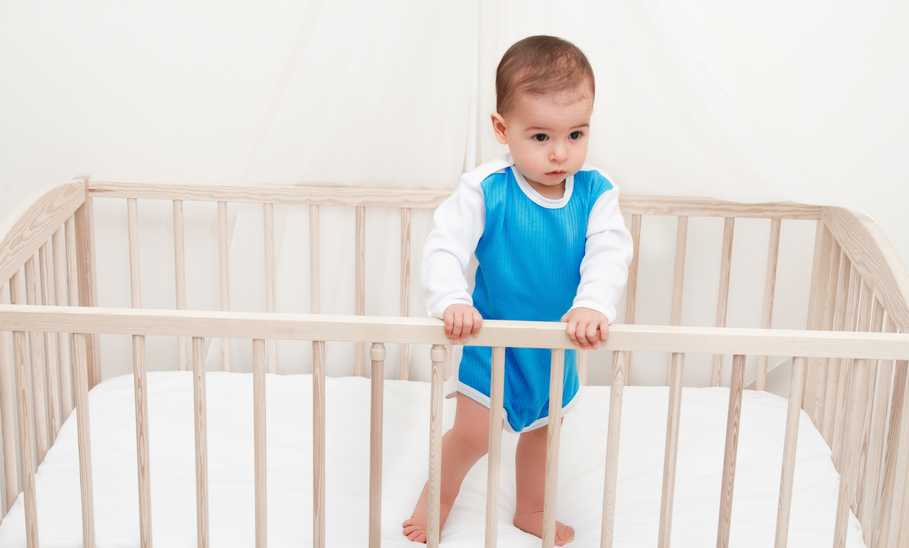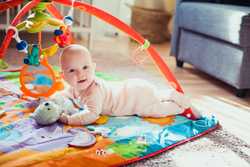When to Move Your Toddler from Crib to Bed

Our evaluations and opinions are not influenced by our advertising relationships, but we may earn a commission from our partners’ links. This content is created by TIME Stamped, under TIME’s direction and produced in accordance with TIME’s editorial guidelines and overseen by TIME’s editorial staff. Learn more about it.
From eating their first solid foods to speaking their first complete sentence, children go through many milestones in their first few years. Another is making the transition from crib to toddler bed. This is a huge deal not only for the child, but parents as well.
I remember when my second child made the move. We knew it was time when he wanted to start sleeping in a big-boy bed like his brother. He also kept “escaping” from his crib as he was tall enough to put his leg over the railing and shimmy his way down to the floor. His first sign of readiness was cute, the second a bit concerning.
We prepared for the transition and made the move. The rest is history. If you’re just starting on this journey, you might be wondering how to transition your own child from crib to toddler bed. I talked to experts who offered advice on how to handle this milestone. Read on for some helpful tips and tricks.
Transitioning from a crib to a bed has more to do with size and maturity than age. The American Academy of Pediatrics recommends children transition from bed to crib once they reach 35 inches or when the crib railing is lower than their chest. At this size, toddlers are more likely to try and climb out of the crib, which can cause serious injury.
If you think your child is ready to move from a crib to a toddler bed, look out for the following signs.
Some children verbalize interest in sleeping in a toddler bed. Others inquire about their sibling's bed or ask their parents when they can sleep in a bed like mommy and daddy. This interest is a good stepping point to moving to a toddler bed.
If your child wakes up at night but can fall back asleep by themselves, this is a sign of independence and, therefore, a good sign of being comfortable in a toddler bed.
If your child is completing their bedtime routines, like brushing their teeth and changing into pajamas, without much fuss, it means they are becoming more independent, and it’s a good sign that they may be ready for the transition.
Climbing out of a crib is dangerous and can lead to serious injury. If your child has tried it once, they will likely do it again. This is a definite sign it’s time to change to a toddler bed.
If your child feels cramped or is no longer comfortable in his crib (doesn’t like the feel of the mattress or generally complains), it may be time to switch.
Read, Also: The Best Toddler Car Seats On The Market
While some children show signs of being ready for a crib-to-bed transition, others do not. Here are a few things to look for before making the move.
If your child is not yet 35 inches and shows no interest in climbing out of bed, they should be content to stay in their crib for a little while longer.
“For children who have sleep disturbances, a transition can worsen this instead of help. It is better to create healthy sleep first and then work on the transition once they have shown signs of readiness,” says Dr. Jenna J. Wheeler, M.D., pediatric critical care physician with Orlando Health Arnold Palmer Hospital for Children. “Remember that each child develops differently, and healthy sleep patterns are an important part of development.”
According to Debbie Gerken, a certified pediatric sleep coach, NICU transition specialist, and postpartum parent educator, here are some things to consider:
A toddler bed is smaller and closer to the ground, which can be safer and provide a sense of comfort during the transition if the child has an easier time getting up and out.
Some cribs are made to transition into a toddler bed by removing sections. This saves parents money by preventing them from needing to immediately purchase a twin bed for the transition. Some toddler beds come with side rails for a little extra security and prevent falls. Also, some toddler beds are made to use a crib mattress—see our guide to knowing what size is a crib mattress, and the best crib mattresses, to make sure you’re getting the right fit.
Purchasing a toddler bed is an expense with short-term use since a toddler will outgrow a smaller bed option. There is limited space for a toddler to move, making sleeping uncomfortable for an active, restless sleeper.
Sit your child down and talk to them about the transition. Explain the expectations and the rules. Clear communication is the key.
“Parents can take the child shopping for sheets, pillows, bedding, or the bed itself. Allowing the child to feel excited about the upcoming change because they are involved in the process can make the transition a lot smoother!” says Gerken.
Test out the new toddler bed before you put your child to sleep in it for the first time.
“Allow the child to help set up the room and let them play in and around it during the day so that it becomes a familiar space for them,” says Gerken. “Role-playing during the day about how they will go into bed and sleep, in addition to understanding where the parent will be, can lessen any fears related to things unknown to them.”
Set a bedtime routine and stick to it. That includes a window with a bath or book time, so your child is mentally ready for sleeping. If your child gets up at night, walk them back to bed consistently. Letting them crawl into bed with you may seem nice, but it can hurt any progress you’ve made thus far.
According to María López, certified pediatric sleep coach and founder of Not a Peep, communication is key. “Openly talking about the change, explaining in detail about what will happen, and with weeks in anticipation will help your child be more welcoming of the idea of a bed,” she says.
Setting clear expectations and boundaries is equally important. If you don’t want your little one wandering out of bed in the middle of the night, make sure to tell them and have a plan for what to do when it happens.
“I highly recommend letting the child have a say when picking the new bed, and finding new bed linens together. Build the bed and place it in your child’s room two weeks before you go through with the transition, this will help your little one familiarize with this new, strange, large piece of furniture in the room,” says López. She also suggests a toddler alarm clock to help teach a child when to stay in bed and when it’s time to get up, that way your child feels like they are taking part in the journey.
Here are a few safety issues to consider when moving your child to a toddler bed.
If your child moves to a toddler bed without a railing, consider installing one to keep falls from happening. Spatially, a bed is very different from a crib. Where your child was once confined to a mattress with four safety walls, the bed provides no protection from falls. It will take your child some time to develop the spatial awareness necessary to keep his body within the confines of his new bed without rolling or falling off the edge.
It will take children a while to adjust to toddler bed, which means getting up and walking around can happen. If you are concerned about your child wandering in the middle of the night, consider a safety gate to keep them confined to their room.
“Once the decision is made to transition, the child will be able to easily get out of their new bed, so make sure that outlets are covered, that the room or area of the house the child will have access to is child-proofed and if there are any stairs that a child could fall down overnight, that a gate or barrier is in place,” says Dr. Wheeler.
You would need to purchase a crib that transitions to a toddler bed. Not all cribs do this. When in doubt, consult your owner's manual or call the manufacturer.
This depends on your child’s height and behavior. If they are 35 inches tall or above, and the crib railing is at chest height, the chance of them falling out of the crib increases, which can cause injury. If your child is not at this height but can still climb out, they should be in a regular bed, despite their age, for safety reasons.
Consistency is the key. Keep your bedtime routines the same every night. Make your reaction to nighttime waking the same, so the child knows what’s expected. Overall, keep things calm and soothing, creating a space conducive to sleep.
The information presented here is created by TIME Stamped and overseen by TIME editorial staff. To learn more, see our About Us page.



